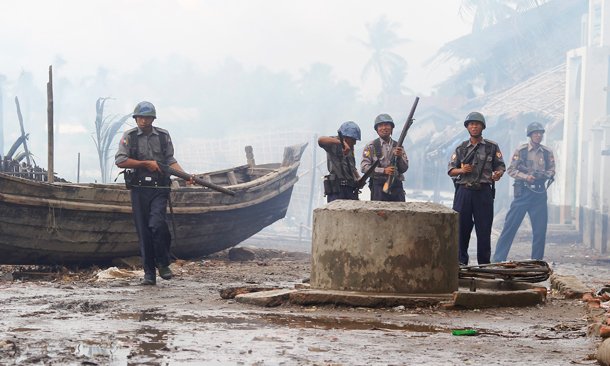A court has sentenced 10 Arakanese Buddhist men to between nine months and three years’ imprisonment in connection with violence that occurred in Arakan State’s Kyauk Taw Township last year.
Judges of the Sittwe Township court on Tuesday ruled that the 10 men, who were detained for their suspected involvement in the conflict last June, were to serve their sentences along with hard labor, according to the defendants’ lawyer Aye Nu Sein.
The unrest in Kyauk Taw was part of a larger spate of violence between Buddhists and Muslims that killed nearly 200 people and displaced more than 100,000 others in Arakan State in June and October of last year. Most of those affected were Rohingya Muslims.
Authorities arrested more than 1,000 people for their suspected roles in the two bouts of violence. Most have since been released, but some are still awaiting trial.
Aye Nu Sein said her clients were sentenced under Section 436 of Burma’s Penal Code for destruction of property by incendiary means, and Section 379 on theft. Officials at the police station in the Kyauk Taw village of Apaukwa acted as plaintiff.
The defendants will appeal the verdict to the district court.
The men are from the villages of Ywar Thit Kay, Kyauk Phyu Su and Kathit Taw in Kyauk Taw. They were arrested soon after the June conflict and accused of destroying houses in a Muslim village near Kathit Taw.
Locals claimed on Thursday that the accused did not commit the crimes and suggested instead that their prosecution was initiated at the order of Burma’s military.
Kyauk Taw resident Maung Maung told The Irrawaddy that “the army troops say they [the 10 villagers] stole cows, but in my view, they just put up the names to be able to prosecute the villagers under the various charges.”
He said the cows’ disappearance was likely a result of the animals escaping during the chaos, as villages burned and attackers pillaged. The cows’ whereabouts remain unknown, he added.
“The army troops also arrested all kinds of people in their path during that conflict, then they sent them to the police station,” Maung Maung said.
Another local, Htun Htun, said he was certain that at least two of the accused men from Kathit Taw were innocent because they were not at the scene of conflict when it happened.
Both residents said the convicted Buddhists are ordinary working men who have families with children. Family members are hoping that their breadwinners will soon be freed, according to Htun Htun.
The Irrawaddy reporter Khin Oo Thar contributed to this report.

















